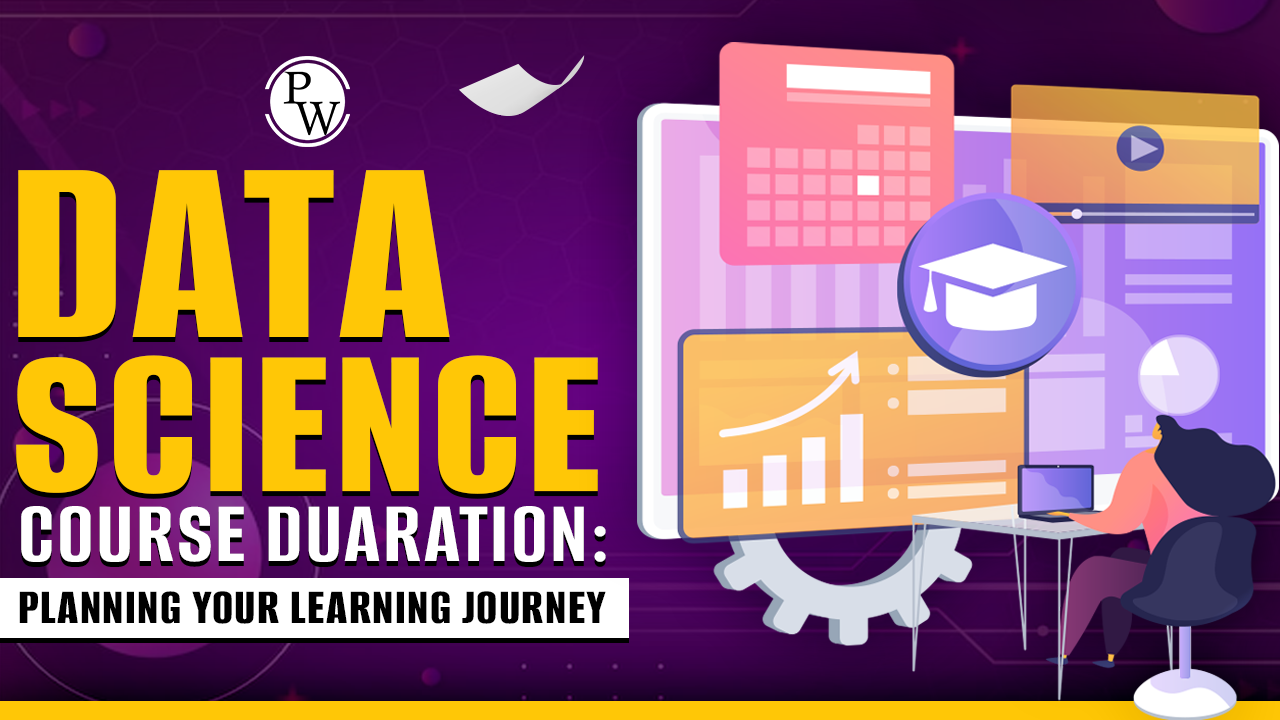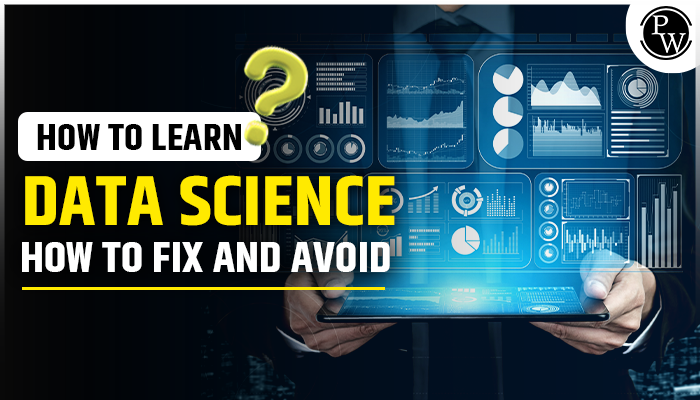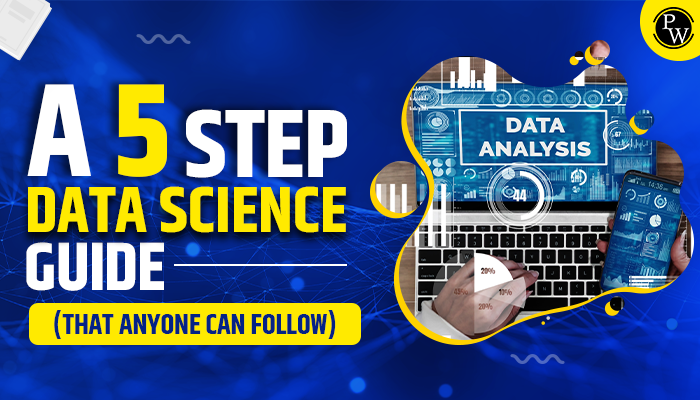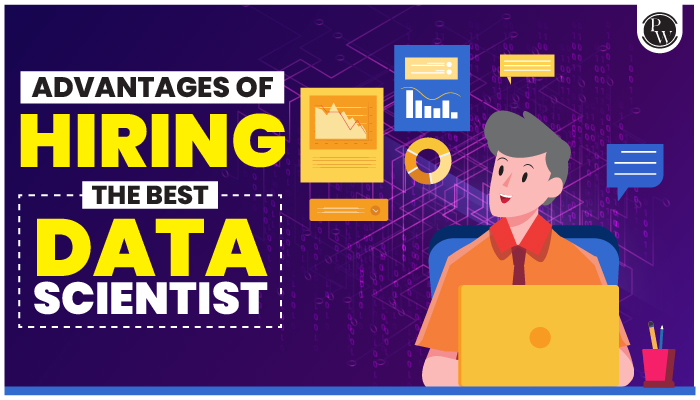Data Science is one of the most profitable professional paths. Learn about the data science course duration today. Let’s get started!
Top colleges and certification institutes are now offering data science courses. Data Science can be studied as a standalone program or as part of a larger program such as Machine Learning, Python, Artificial Intelligence, or Data Analytics. A Data Science course online is the ideal approach for someone who wants to learn about Data Science. The main platforms for online Data Science courses include Udemy, Coursera, PW, and edX.
The eligibility for a Data Science course (post-graduation or diploma) is to have a bachelor’s degree in engineering or science stream. Participants must have a basic understanding of statistics and mathematics. Undergraduate data science courses require students to have a minimum GPA of 3.0 and a core subject of Math, Statistics, or Computer Science.
The article lists top-notch data science courses duration, degrees, and projects suitable for students, working professionals, and freshers in the early stages of their careers, all aiming to pursue a career as Data Scientists.
What is Data Science?
Data science is the study that deals with a high volume of data to find unseen patterns, insights and predict future outcomes. It is a vast domain that involves Mathematics, Business and Statistical Acumen, Statistics, Artificial Intelligence, Machine Learning.
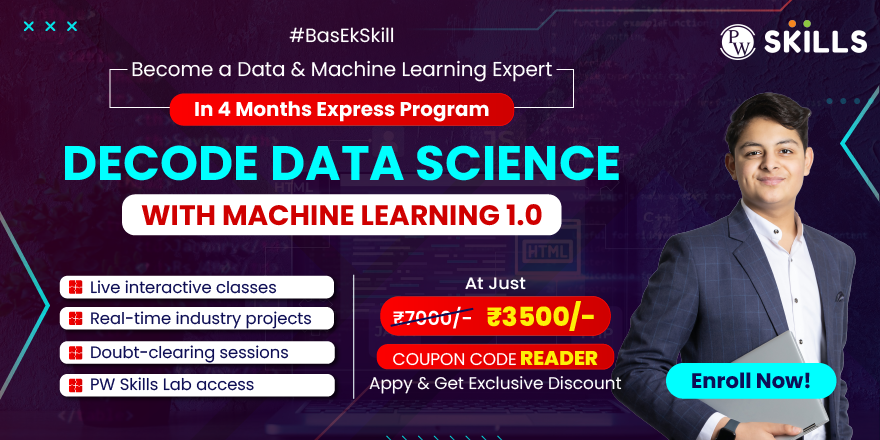
In a Data Science course, students learn about various Machine Learning algorithms, tools and software that help them to analyze data.
Data Science Course Duration
One can pursue data science education in various ways, one of the best ways is the online course. These courses offer a diverse curriculum, with core courses and real-world projects. Data science course duration also plays a major role and this course get fully fit in time.
Full Stack Data Science Pro by PW courses provide a convenient and self-paced learning experience.
| Full Stack Data Science Pro Course by PW | |
| Curriculum | Full Stack Data Science Pro encompasses a broad spectrum of data science skills, starting with Python and progressing to data structures, machine learning, SQL, exploratory data analysis, mathematics, and advanced areas such as deep learning, computer vision, and natural language processing. |
| Course Fee (INR) | ₹20,000.00 (Original Price: ₹40,000.00 with a 50% Discount) |
| Duration | 12 Months |
| Language | English |
| Learning Mode | Online, Instructor-led Live Classes |
| Skills You Will Gain | Python, Statistics, Machine Learning, Deep Learning, Computer Vision (CV), Natural Language Processing (NLP), Big Data |
Key Components of a Data Science Course
Data science courses are designed to provide understanding about:
- Core Curriculum,
- Elective options, and
- Hands-on experience through projects.
These essential elements serve as the pillar of a good data science course.
Also read: Top 22 Data Science Companies You Should Know
Core Curriculum
- Understanding the Foundational Components of Data Science: The core curriculum serves as the foundation of a data science course. It focuses on essential skills in statistics, programming, data analysis, and data visualization.
- Common Subjects: Common subjects such as data analysis, statistical methods, programming languages (e.g., Python, R), machine learning, and data mining are must. As these subjects provide a strong base.
Electives and Specialization Options
- Specialization Within Data Science: Being a vast field, data science offers students various specializations such as artificial intelligence, big data analytics, business intelligence, or bioinformatics.
- The Flexibility to Choose Specializations: Elective courses in data science programs allow flexibility. Students can personalize their curriculum to their career objectives and interests, ensuring they gain knowledge in areas relevant to their chosen route.
Projects and Real-World Applications
- Hands-On Projects in Data Science: Hands-on projects are essential components of data science, as they act as a bridge between theory and practice, helping students to apply what they’ve learned in the real-world. Moreover, projects help to reinforce learning and teach problem-solving abilities.
- Real-World Applications Learning: By working on projects that tackle actual data problems, students gain valuable experience, learn to make data-driven decisions, and develop a portfolio showcasing their capabilities.
By including these essential elements into a data science course, students will obtain a thorough education that will prepare them for the dynamic and ever-changing area of data science.
Also read: Pros and Cons of Online Data Science Degree
Tips for Successful Data Science Learning
Data science is a rapidly evolving field, and successful learning requires a combination of effective time management, resource utilisation, project development, and networking. In this section, we will learn the proven successful data science tips to experience exponential growth. Let’s learn each tip in detail:
- Develop an understanding of business goals: Data scientists often play with statistics and understand how data work connects to a business objective.
- Don’t forget the basics: It is essential to have a strong foundation in mathematics and statistics to understand and work with complex data sets.
- Stay up to date: Data Science is a constantly evolving field, with new tools and techniques being developed all the time. It is important to keep up to date with the latest technology, so that you are able to use the best tools available to solve complex problems.
- Develop strong technical skills: This field requires strong technical skills including expertise in programming languages [Python and R], statistics, programming, mathematics, and data visualization with communication skill as must.
- Business acumen: Apart from technical skills, it is also important to have business acumen, to understand the needs of the business and find ways to use data to solve problems.
- Consider taking a course: Even if you already know a lot about data science, participating in a course can help you better understand the tools and techniques that are required for a particular function.
- Build a portfolio: Practicing data analysis and science is one of the most important things to do. However, rather than simply dumping each project, strive to optimize each project to showcase your abilities. Find a safe location to store all of your projects as your data science portfolio so that when you are called in for an interview, you can showcase them.
- Work on real-world data science projects: There are many online repositories, such as GitHub, that provide datasets that you may use to practice your data wrangling, modeling, and visualization abilities. Working on projects is also a wonderful method to construct your portfolio, which will be useful when it comes time to apply for jobs.
- Seeking for Mentorship and Networking Opportunities: Attend data science meetups, conferences, and webinars to connect with professionals, learn about job opportunities, and exchange ideas. Moreover, create a GitHub repository to host your projects and code, making it easy for others to review your work.
By using these data science tips into the learning process, you’ll be able to build a strong foundation with necessary skills for a successful career.
In conclusion, data science offers a wide range of learning opportunities, from bachelor’s to doctorate programs, as well as online courses and bootcamps are there to help us out. It’s a vast field that has mathematics and statistics, technical expertise, and understanding of business objectives as a base. In this data driven era, staying up to date with the latest tools and techniques, building a portfolio, and seeking mentorship and networking opportunities are essential for success. Whether you’re a beginner or an experienced professional, data science education can help you achieve your career goals.
Data Science Course FAQs
What are the most valuable skills for a data scientist while pursuing data science courses?
The most valuable skills learned as a data scientist are Python, Tableau, R, and in-depth knowledge of Hadoop.
What is data science course eligibility?
For Offline courses anyone who has completed class 12 is eligible, whereas for online there is no such criteria, but basic knowledge is must.
Which is better: AI or data science?
Data Science is all about analyzing and interpreting data to drive business decisions and solve real-world problems. Whereas AI is about building intelligent systems, working on AI algorithms, and pushing the boundaries of technology, etc.
Is 6 months enough to study data science?
A 6-month timeframe for studying data science is feasible for individuals with a solid foundation, intense study, and well-structured programs, but expertise may require more time.
Can I study data science online?
Yes, anyone who is passionate about learning data science can study data science online. Online data science courses come in various formats, including certificates, diplomas, and degree programs. Udemy, Coursera and PW are the top platforms known for the best data science courses online.

